The Australian shake-up of Eurovision
- Published
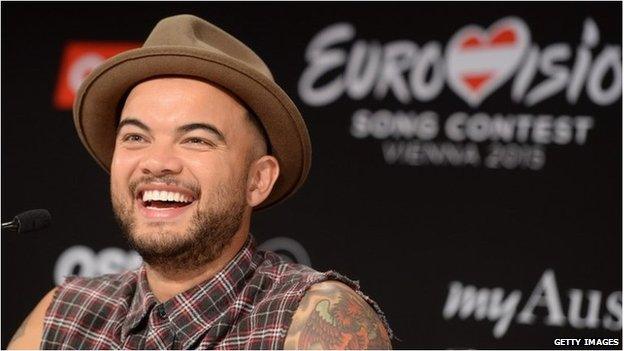
When Eurovision announced in February that Australia - which is distinctly not in Europe - would be taking part in this year's contest, diehard Eurovision fans thought April Fool's Day had come early.
It may be supposedly a one-off appearance to make the 60th anniversary of the contest, but could Australia actually win this Saturday? Might it tip the scales in a finely balanced vote, where divas and innocent celebrations of all things kitsch come face to face with brute realities of European political and cultural voting?
Daniel Gould, a Eurovision analyst, envisages what could happen.

Australia is in this ONE time - maybe
Eurovision's organising body, the EBU, did have an explanation for this year's surprise entrant. They said that as Australia had long broadcast the contest, extending an invitation chimed with this year's theme of Building Bridges, external.
It may also be far from Europe, but there was the sense that Australia is culturally close, as a home, after all, to many European immigrants.
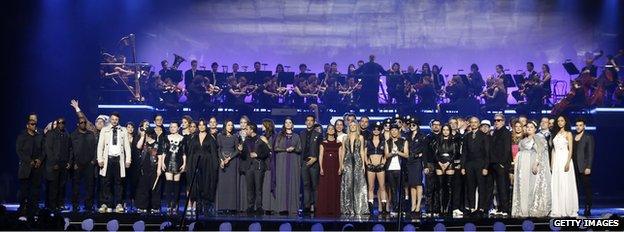
Is there room in Eurovision for more outsiders?
But some Eurovision loyalists suspect a plan to expand the competition beyond fortress Europe and combined with the unstoppable force that is Australia - this means some nerves are fraying.
Typically, Australia are in it to win it
Once invited, the Australians just went for it. They picked one of their best singers, Guy Sebastian, the upbeat and bouncy winner of the Australian idol competition, who proved himself game by writing an entirely new set of songs in just 72 hours. The best one, a modern R&B number called Tonight Again, external, with echoes of the recent hit Uptown Funk, was chosen.
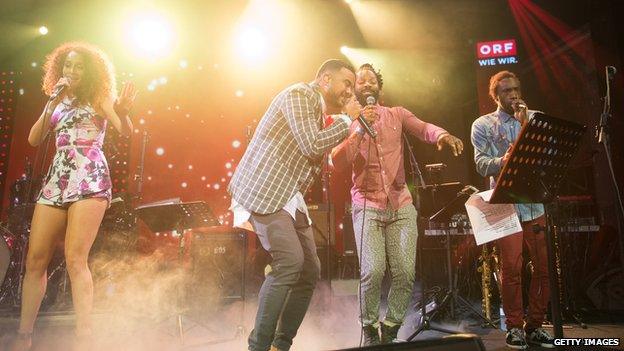
Guy has been drumming up support in a pre-Eurovision European tour
He travelled around Europe in a sustained charm offensive, regularly telling Europe how "stoked" he is to be there. U2's lighting designer Bruce Ramos is also on board for the stage show.
At the back of my mind is the comparison with the UK's somewhat more lackadaisical approach, which was to pick a singer who all four judges didn't turn around for in The Voice competition, in partnership with a teacher who is part of a Rolling Stones tribute band.
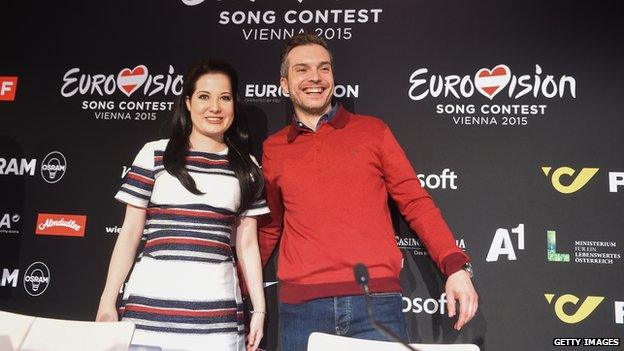
Electro Velvet representing the UK - a failed Voice contestant and a teacher who's in a tribute act
And unsurprisingly Australia's odds have just got shorter and shorter
The novelty of Australia's participation got the attention of bookmakers. In a competition full of ballads, his decision to choose one that stood out against the sleepy ballads of other competitors, halved his odds again.
He started making promotional appearances, winning over crowds with his live performances and now Australia is third favourite to win, behind Sweden and Italy.
Scenarios to disrupt a hallowed balance of power
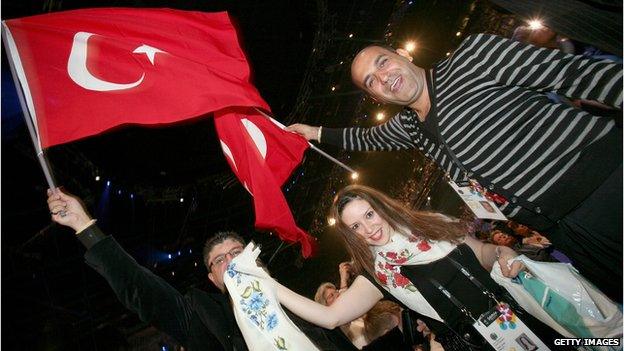
A loyal Turkish diaspora has meant steady success for Turkey since 2003
But it is not just the Australian singer who can make an impact. For the first time the Australian voting public has a say in the contest, too, and enthusiastic Australian audiences could be a hilariously disruptive force in voting.
Diaspora voting has long been a powerful force in the televotes. Ever since, 2003 Turkey has never failed to score fewer than 91 points in a Eurovision final - thanks to loyal immigrant populations.
So imagine these scenarios, which may never come to pass, but which could get the sweat trickling down the brows of Eurovision's traditional big hitters.
Scenario One: We're down to the final vote. Australia and Sweden top the scoreboard with the same amount of points, and the UK holds it all in the balance with their votes. They go for Australia, upsetting decades of quiet respect for their successful Scandinavian neighbours, and showing that loyalties may just lie with brethren thousands of miles away where historical ties run deep. The competitive Swedes hold a Eurovision grudge against the UK forever more. The UK's chances of ever winning again may just have died.
Scenario Two: It's final vote time and this time the Australian public hold the balance of power. The massive Greek population in Australia kick into action and they vote Greece into the top place, giving joy to a nation searching for a way out of economic crisis. Perhaps Yanis Varoufakis, Greek finance minister and former Melbourne University professor, was high in their minds.
Scenario Three: Australia also gets to vote in the two semi-finals, which they themselves by-pass with an automatic wildcard into the final. For most smaller European nations, participating in Saturday's extravaganza depends on finishing in the top 10 in the Tuesday or Thursday heats. Will the large Serbian population in Australia manage to sway the vote and push this outsider into the final from the Tuesday heat; and if so, at the expense of whom? Albania?
And what if Australia really wins?
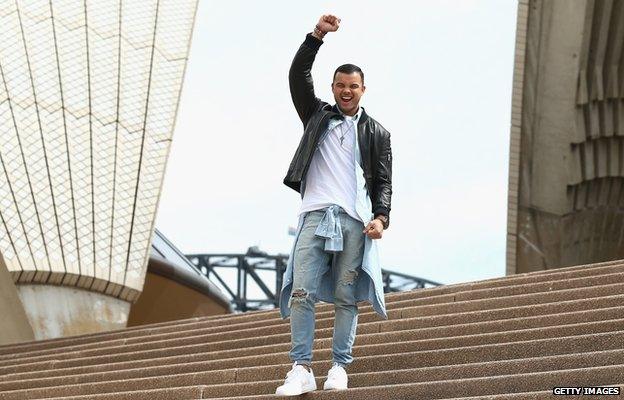
Win or lose, Guy will never get to welcome Eurovision back to Australia
Traditionally, the winner hosts the following year's show. Organisers have said that Australia cannot be a host, but their broadcaster SBS could co-organise the event with another European country where the contest would take place.
Perhaps it will force countries like the UK to realise they need to up their Eurovision game once they've been shown exactly how it's done.
- Published19 May 2015
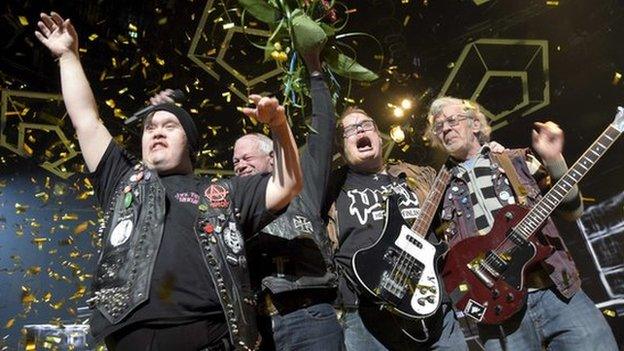
- Published5 March 2015
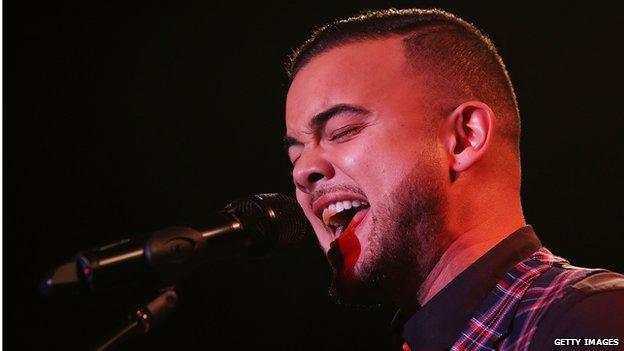
- Published12 May 2015
